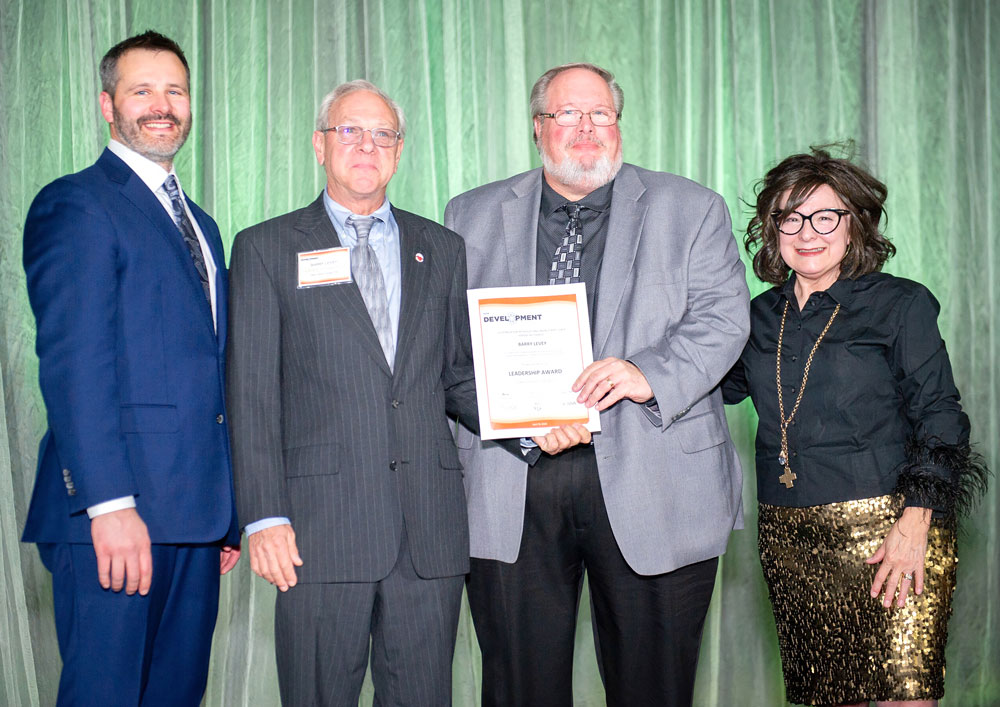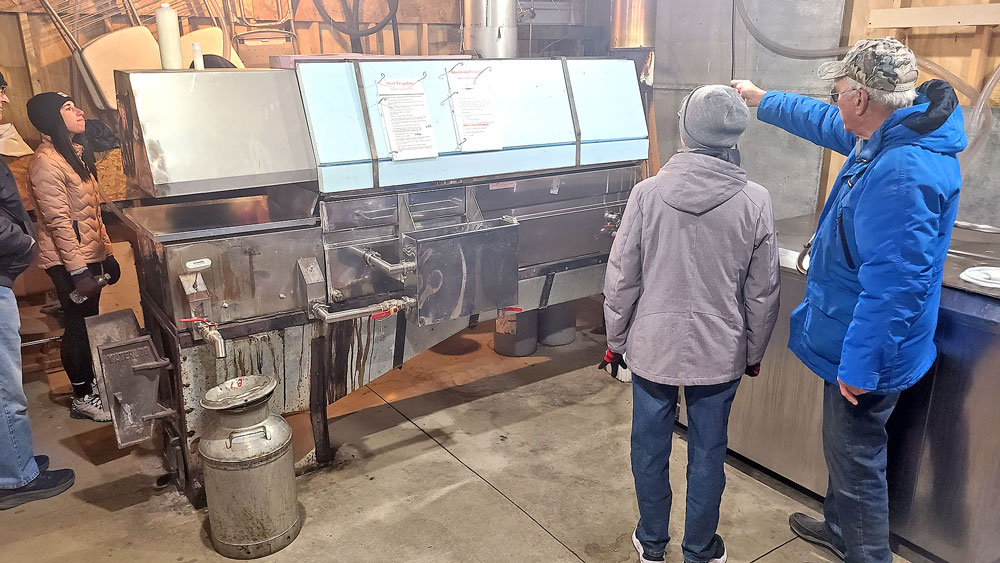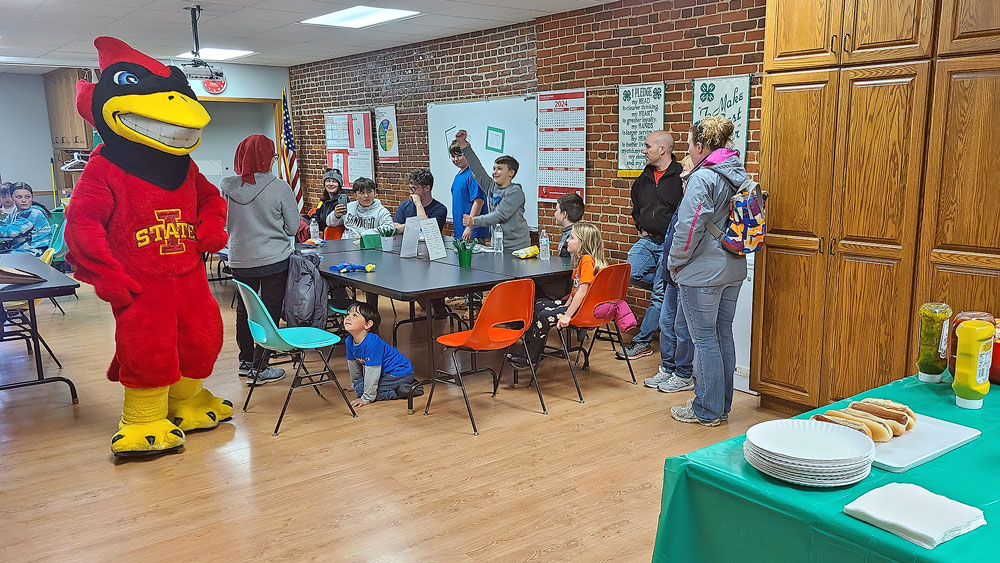Iowa historian makes presentations in Charles City

By James Grob, jgrob@charlescitypress.com
Michael Luick-Thrams believes history is just a mirror into our present world — and often, we don’t like the reflection.
“Often times we don’t want to see what it says to us,” he said. “Like the flu pandemic (of 1918) — everyone in America was touched in a way, and yet, within months no one talked about it anymore. It reminds me of global climate change. It’s something that affects all of us, but we hardly talk about it. Certainly not the scope we should be, given the magnitude of the issue.”
Luick-Thrams, an author and historian, is executive director of Traces Center for History and Culture in Mason City. He began recording Americans’ experiences in Nazi Germany in 1989, then completed doctoral studies in Berlin in 1997.
About 165 students and community members turned out at the high school gym Monday morning to hear Luick-Thrams talk, and about 25 more joined him for a presentation at the Charles City Public Library Monday afternoon, as part of a five-week speaking tour.
Luick-Thrams discussed “Hidden Histories, Taboo Topics” to Charles City High School sophomores. The program included two presentations at the Charles City High School, “Kickin’ the Kaiser” and “The Klan: The White Cancer,” and one presentation at the library, “One of the Deadliest Killers Ever: The 1918 Flu Pandemic.”
“Exactly now, 100 years ago, all hell was about to break loose,” he told listeners at the library. He noted that 16 million died from the fighting in World War I, while at the same time, 50 million people died from the flu.
The numbers were staggering, Luick-Thrams said. Six thousand Iowans died, while 675,000 Americans died. Ten million died in China, 20 million in India, 400,000 died in France and 600,000 died in Germany.
More than 30,000 U.S. doctors were in Europe tending to the soldiers, and in major cities like Philadelphia, the outbreak was a “biblical image of hell,” he said.
“Some young people today think of this as ancient history,” he said. “This wasn’t that long ago. How can it be that people forgot such a huge event?”
Called the “Spanish Flu,” the flu actually got its start at Fort Riley, Kansas, and unlike other outbreaks, this one was especially deadly to the young and healthy.
The reason for that, Luick-Thrams explained, was the strain of the virus mutated while in Europe.
“It was related to the one that broke out in Kansas in March of 2018, but when it went to Europe and returned, there are different theories about why it came back so virulent, but whatever the reason, it came back even more ugly than before,” he said.
Luick-Thrams said it literally attacked the healthiest people, and they suffered because their immune systems fought back and over-reacted.
“Their bodies kept producing white blood cells and other things to fight the virus, and they drowned in their own fluids,” he said.
Luick-Thrams has completed many speaking tours across the U.S. and, among other books, he is the author of “Out of Hitler’s Reach,” about Iowa’s Scattergood Hostel, where refugees from Nazi-occupied Europe found a new life. The book contains interviews with 40 refugees who fled the Nazis and came to Iowa during World War II.
“Dig into history and you’ll be surprised at what you find,” he said.
Luick-Thrams’ has 16 historical publications available, including a book, “Signs of Life: The Correspondence of German POWs at Camp Algona, Iowa 1943-46,” about German POWs during World War II who were housed in Iowa, including in Charles City at Wildwood Golf Course. “Camp Charles City” was one of 10 camps in Iowa and the book is a catalogue of letters that German POWs wrote from their camps.
“They were sent over to Floyd and Rockford and other places to work,” he said.
The “Kickin’ the Kaiser” presentation at the high school included a history of the book-burning in Osage in May of 1918.
“They gathered all the German-language books, sheet music, maps, pamphlets and whatever and burned them publicly,” Luick-Thrams said. “Around the same time the Iowa governor banned the speaking of all foreign languages.”
In the presentation, “The Klan: The White Cancer,” Luick-Thrams discussed backstories behind the three waves of America’s terroristic hydra, the Ku Klux Klan, with emphasis on the “Second Wave,” which in the 1920s stormed the American Heartland.
“In Iowa, there were many Klan members, and they weren’t particularly anti-Black, they were anti-Catholic,” he said.
Some Iowa communities and surrounding counties contained unusually high numbers of KKK members.
“One of the reasons I talk about the KKK, even though I hate the topic, is my great-grandfather was in the Klan,” he said. “I knew him, and we all loved him, but he did a really stupid thing — he was in the Klan.”
Luick-Thrams, a native of Cerro Gordo County, said many thought the Klan was a good thing.
“The Klan said they would protect morality, they were against bootleg whiskey, loose morals and marijuana,” he said. “The Klan and the anti-German stories are all really about manufacturing hate. In that case, it was the German-Americans, but it could have been the Irish-Americans, could’ve been blacks, could’ve been gays, Jews. Whenever a government and other leading bodies generate hate, it ends badly. We need to stop hating.”









Social Share